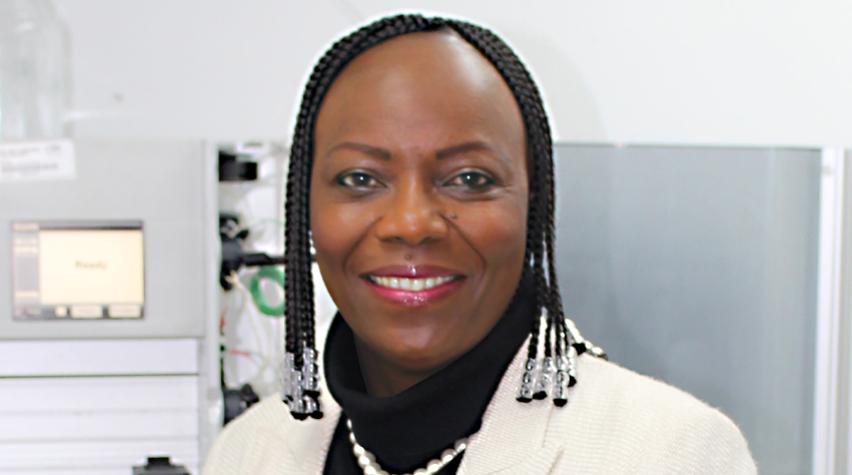
Organized by AIChE’s Society for Biological Engineering (SBE), the 8th International Conference on Accelerating Biopharmaceutical Development will be held September 6-8, 2023 in The Royal Sonesta Boston, Cambridge, MA. The conference will feature interdisciplinary thought leaders and decision makers who will discuss the arena’s latest modalities and advances in bringing medicines to patients, faster. Among many topics, this year’s program details how the pandemic helped to accelerate the development of vaccines and therapeutics. Reserve your spot today.
We caught up with keynote speaker Rachel Chikwamba, Group Executive: Advanced Chemistry and Life Sciences at the South African Council for Scientific and Industrial Research (CSIR), to discuss advancements and challenges in the biopharmaceutical industry and patient access, and the future of the industry.
What are some of the technologies trending that help accelerate biopharmaceutical development?
Numerous technologies along the research, development and deployment value chain will accelerate biopharmaceutical development. These include technologies that accelerate discovery of drug product targets, efficient host expression systems and manufacturing systems. Notably, technologies like AI, AR/VR are accelerating both discovery and manufacturing process optimisation, especially when coupled with big data and big data analytics. Single use technology powered bioreactors which are relatively easy to set up and are flexible are making their mark in transforming how we manufacture biologics. Bioprinted organ models are also increasing in potential impact in bringing efficiency to safety and efficacy of therapeutic candidates. High-impact technologies will include those that drive efficient production of end products with minimal steps, reducing the cost of goods. I believe that manufacturing systems - in particular those that are intuitive to use, low cost, small footprint and deployable in low- and middle-income countries (LMICs) to allow greater access to health products - will have the greatest impact.
What are some of the challenges in the biopharmaceutical industry and patient access and how do you envision the industry moving forward?
The challenges include a huge burden of disease for conditions that impact significant populations that cannot afford to pay. Such examples of diseases include a myriad of infectious diseases, a variety of cancers, cardiovascular disease, and other chronic diseases such as diabetes.
At a high level, challenges for patients include the effectiveness of health systems overall, ability to efficiently offer services, diagnose disease, price, and availability of treatments, and in LMICs, chronic shortages of critical medicines. This is typically the case where there is a small private sector catering to the elite and the bulk of health products for most of the population are procured by the government. In such cases, expensive but lifesaving medicines are simply not available if governments cannot afford them. Chronic drug shortages arise in the importation of medicines, where security of supply is not guaranteed, and disruptions in the supply chain can lead to prolonged shortages of critical medicines.
From a manufacturer’s perspective, where a significant proportion of the citizens cannot procure privately and government cannot provide offtake guarantees for local production, the case for investment can be challenging to make. Local manufacture and distribution of some of these products at a cost that is affordable would be the ideal, but some of the local markets are too small to make local production desirable. This in many cases is aggravated by the regulatory capabilities in countries seeking strategic independence, where these are usually rudimentary or just emerging. A regional approach to manufacturing and regulation in such cases makes sense to provide economies of scale. Harmonized facility and product development and deployment regulation will encourage industry investment in regional production. Technologies that can be readily deployed to provide quality products on demand are highly relevant to the way forward. Also critical to the way forward, are strong research and development ecosystems and the supply of a suitably trained workforce to support the industry.
Clearly a systems perspective is required to support the industry and improve patient access, as the challenges and solutions go well beyond technology. Key attributes of such an approach will include deliberateness of policy to strengthen local industry development, deeper understanding of the different target market dynamics and global collaboration in research and development through to technology and product deployment.
What specifically will you be talking about at the conference?
My talk at the conference will provide my perspective of strategic capabilities that will strengthen the continent’s health security, and what my organization, South Africa’s Council for Scientific and Industrial Research is doing to contribute to this cause. These perspectives are shaped a lot by the enduring lessons of the Covid-19 pandemic, and the perennial challenges of access to life-saving medicines that we experience.
What are you looking forward to the most at this year’s conference?
I am looking forward to learning the state of play in technology development and the advancements in the business and regulatory environment that are driving the biomanufacturing industry globally discussion the conditions the conditions that would be necessary for their advancement.
What message would you like the audience to take away from this year’s program?
As one of the generations that was caught unprepared by the pandemic, I want to convey the importance of not just global pandemic preparedness, but also the critical need for leveraging global collaboration to strengthen local resilience to ensure that we and the next generations are prepared for the next pandemic. The global strategic response that we can mount against any future threats will only be as strong as the weakest links in our systems, so collaboration, inclusion and equity are paramount!
About SBE
Established in 2004, the Society for Biological Engineering is a technological community for engineers and applied scientists integrating biology with engineering. Members of SBE come from a broad spectrum of industries and disciplines and share in SBE’s mission of realizing the benefits of bioprocessing, biomedical, and biomolecular applications. Learn more about SBE.


